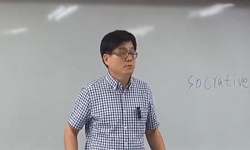2007 revised National Curriculum by Ministry of Education, Science and Technology was revised again in 2009, the itemized details for ‘History’ subject was amended in 2010. From 2011, newly revised curriculum for history turned out to have undesir...
http://chineseinput.net/에서 pinyin(병음)방식으로 중국어를 변환할 수 있습니다.
변환된 중국어를 복사하여 사용하시면 됩니다.
- 中文 을 입력하시려면 zhongwen을 입력하시고 space를누르시면됩니다.
- 北京 을 입력하시려면 beijing을 입력하시고 space를 누르시면 됩니다.

2009 개정 교육과정과 고등학교 국사 교육 = 2009 National Curriculum Amendment and Korean History Education in High School
한글로보기https://www.riss.kr/link?id=A82623857
- 저자
- 발행기관
- 학술지명
- 권호사항
-
발행연도
2011
-
작성언어
Korean
- 주제어
-
KDC
900
-
등재정보
KCI등재
-
자료형태
학술저널
-
수록면
219-249(31쪽)
-
KCI 피인용횟수
3
- 제공처
- 소장기관
-
0
상세조회 -
0
다운로드
부가정보
다국어 초록 (Multilingual Abstract)
First, formerly separate subjects known as ‘National History’ and ‘Korean Contemporary History’ are unified as ‘Korean History’. But in the process of the integration, ‘Korean Contemporary History’ has sharply cut down and ‘Economic History’, ‘Social Science’ and ‘Cultural History’ have particularly not been dealt at all.
Second, ‘Korean History’ has been decided to be taught 5 times a week, which means less history education than before. The 7th National Curriculum demanded to complete 200 hours of ‘National History’ and ‘Korean Contemporary History’, but 2009 revised National Curriculum notifies 85 hours of course completion for ‘Korean History’.
Third, with introduction of intensive course completion, ‘Korean History’ course is completed within a semester, therefore resulting in growing number of students who give up to complete the course.
The government is taking on the plan to make ‘Korean history’ as a required subject. However, for ‘Korean History’ to be taught successfully in high schools, making the subject as compulsory is not the critical issue. To genuinely reinforce Korean history education, it would be more crucial to make all the test applicants for National Academic Aptitude Test take ‘Korean History’ test.
2007 revised National Curriculum by Ministry of Education, Science and Technology was revised again in 2009, the itemized details for ‘History’ subject was amended in 2010. From 2011, newly revised curriculum for history turned out to have undesirable affects on history education. They are summarized as below.
First, formerly separate subjects known as ‘National History’ and ‘Korean Contemporary History’ are unified as ‘Korean History’. But in the process of the integration, ‘Korean Contemporary History’ has sharply cut down and ‘Economic History’, ‘Social Science’ and ‘Cultural History’ have particularly not been dealt at all.
Second, ‘Korean History’ has been decided to be taught 5 times a week, which means less history education than before. The 7th National Curriculum demanded to complete 200 hours of ‘National History’ and ‘Korean Contemporary History’, but 2009 revised National Curriculum notifies 85 hours of course completion for ‘Korean History’.
Third, with introduction of intensive course completion, ‘Korean History’ course is completed within a semester, therefore resulting in growing number of students who give up to complete the course.
The government is taking on the plan to make ‘Korean history’ as a required subject. However, for ‘Korean History’ to be taught successfully in high schools, making the subject as compulsory is not the critical issue. To genuinely reinforce Korean history education, it would be more crucial to make all the test applicants for National Academic Aptitude Test take ‘Korean History’ test.
목차 (Table of Contents)
- 1. 서언
- 2. 교육과정 변화와 〈국사〉 과목
- 3. 집중이수제의 문제점
- 4. 대학수학능력시험에서 〈국사〉 과목의 변천과 영향
- 5. 제언
- 1. 서언
- 2. 교육과정 변화와 〈국사〉 과목
- 3. 집중이수제의 문제점
- 4. 대학수학능력시험에서 〈국사〉 과목의 변천과 영향
- 5. 제언
동일학술지(권/호) 다른 논문
-
- 歷史敎育硏究會
- 金美先(Kim Mi-Sun)
- 2011
- KCI등재
-
- 歷史敎育硏究會
- 韓政洙(Han Jung-Soo)
- 2011
- KCI등재
-
- 歷史敎育硏究會
- 金成奎(Kim Sung-Kyu)
- 2011
- KCI등재
-
과학이라는 전통의 창출과 홍이섭의 조선시대 과학사 연구
- 歷史敎育硏究會
- 鄭多函(Chong Da-Ham)
- 2011
- KCI등재
분석정보
인용정보 인용지수 설명보기
학술지 이력
| 연월일 | 이력구분 | 이력상세 | 등재구분 |
|---|---|---|---|
| 2022 | 평가예정 | 재인증평가 신청대상 (재인증) | |
| 2019-01-01 | 평가 | 등재학술지 유지 (계속평가) |  |
| 2016-01-01 | 평가 | 등재학술지 유지 (계속평가) |  |
| 2013-01-01 | 평가 | 등재학술지 유지 (등재유지) |  |
| 2010-01-01 | 평가 | 등재학술지 유지 (등재유지) |  |
| 2008-01-01 | 평가 | 등재학술지 유지 (등재유지) |  |
| 2006-01-01 | 평가 | 등재학술지 유지 (등재유지) |  |
| 2004-01-01 | 평가 | 등재학술지 유지 (등재유지) |  |
| 2001-07-01 | 평가 | 등재학술지 선정 (등재후보2차) |  |
| 1999-01-01 | 평가 | 등재후보학술지 선정 (신규평가) |  |
학술지 인용정보
| 기준연도 | WOS-KCI 통합IF(2년) | KCIF(2년) | KCIF(3년) |
|---|---|---|---|
| 2016 | 1 | 1 | 0.94 |
| KCIF(4년) | KCIF(5년) | 중심성지수(3년) | 즉시성지수 |
| 0.94 | 0.96 | 1.598 | 0.59 |




 DBpia
DBpia



